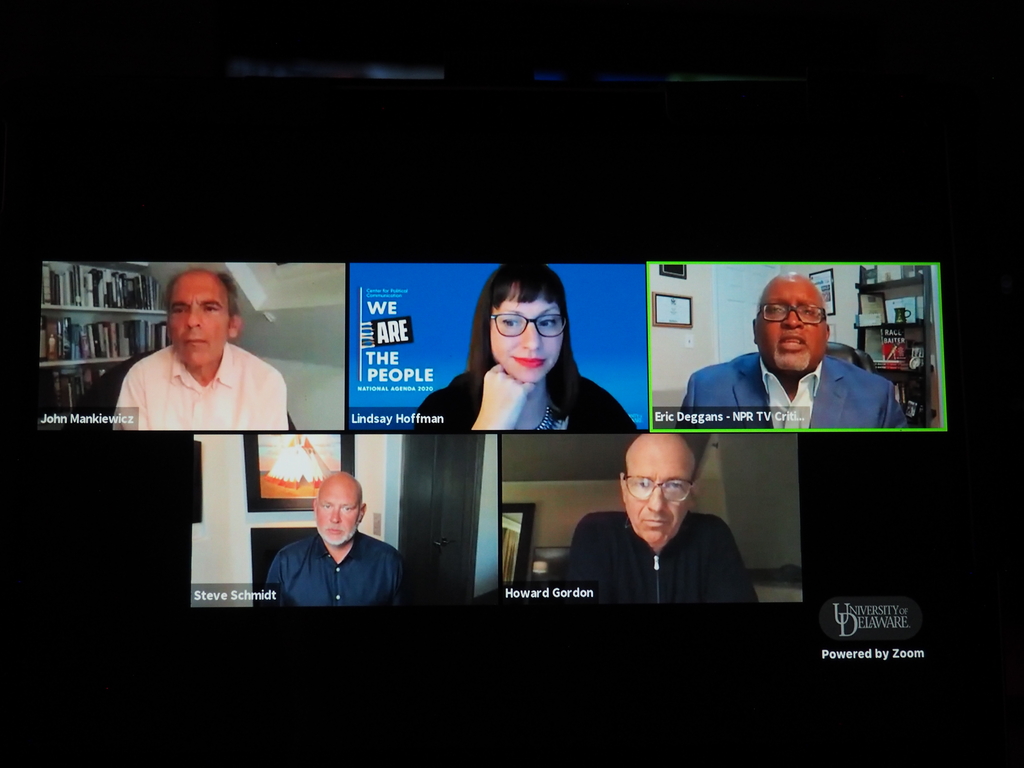National Agenda Fact vs Fiction : Reflecting the Human Experience
Blue Hens connect with Hollywood and D.C. insiders

By Sean O’Connor, University of Delaware senior and intern for the University of Delaware’s Center for Political Communication
Watch the video. Read the transcript. To learn more about the National Agenda student experience, read “Keeping the Conversation Going” by CPC intern and National Agenda student Sean O’Connor.
NOVEMBER 17, 2020″How do storytellers accurately depict political stories and characters while entertaining the audience and not choosing sides? On September 30, the University of Delaware’s Center for Political Communication welcomed political minds from Washington, D.C., to Hollywood to compare fictional portrayals of the presidency and politics with the “real thing.”
“Hollywood has not done a great job of portraying the intense partisanship that we”re stuck in right now,” said Eric Deggans, a television critic for National Public Radio. Howard Gordon, the co-creator of Homeland, Showtime’s award-winning series (2011?2020), responded that his characters and stories are fictional analogs, “reflecting [the real world] but not quite mirroring it – Once you start naming it, you start drawing the analogies and then it gets reduced to polemic or to partisan”you”re now just an echo chamber for something.”
Gordon said he was more interested in exploring the human experience of making impossible choices. “One of the great parts of being a writer here is making people just think differently than they might otherwise have about the world we”re living in, about the choices they’re having to make as citizens and as Americans in a way that is not a white paper or an article or a documentary. I think you experience story, stories in a much more emotional and accessible way that hopefully expands your understanding.”
Lindsay Hoffman, Ph.D., director of the National Agenda program, hosted the Zoom webinar, “Fact vs. Fiction.” Also joining the conversation were John Mankiewicz, co-executive producer of Netflix’s House of Cards, and Steve Schmidt, a UD alumnus (AS13) and co-founder of the Lincoln Project, a political action committee.
Distinguishing between fact and fiction has become more difficult for Americans, said Deggans. He expressed concern about ‘so-called reality TV shows,” which are often scripted and blend fact with fiction. A&E’s Live PD and Paramount’s COPS (both cancelled in 2020 following the protests over the death of George Floyd last May) “present a constructed reality in terms of how policing works in America that can blind people to how it actually works and who actually is being hurt by it,” said Deggans. Cable and television news exert editorial control to manufacture a “reality that tells certain people that the way they see the world is the way the world is, although it’s not true.” Deggans cited denials by Fox News personalities that systemic racism exists.
House of Cards, Netflix’s 2013 to 2018 political thriller series, depicted the U.S. President Frank Underwood as a cunning, ruthless politician who would do anything to stay in power. Mankiewicz said he thought the show would end when Trump got elected. ?[Trump] so surpassed the Underwood administration that House of Cards was impossible to keep going,” said Mankiewicz. ?[Underwood] wouldn’t say the things that he was thinking out loud the way Trump does.”
Gordon’s 24, a 2001 to 2014 drama series on Fox, “helped people picture that a black man could be president in America,” said Deggans. Actor Dennis Haysbert played President David Palmer “years before Barack Obama was actually elected.” Deggans asked Howard Gordon whether he thinks portrayals by individuals like Haysbert can make America “dream.” Gordon, an acclaimed television producer and writer who also produced Tyrant and X-Files, said ‘stories in film and television have absolutely been aspirational, and have helped us discover as a country and as a society our better selves.”
Hoffman asked Schdmit how the story of 2020 will be told on TV and whether Americans should be worried that the media is increasingly blurring the lines between fact and fiction. Schmidt, who managed John McCain’s 2008 presidential campaign, accused President Trump of blatant lies and distractions. “There’s going to come a time where artistically we need to slow it all down. And as we make it through this, and I hope we will, that we start to back up from the line, a very dangerous line that Trump has brought us to.”
Schmidt attributed the 2020 election to shaping the future of our country, and in turn future TV and Hollywood productions. “There will be revisionist pieces of art that come from this era? and there will ultimately be art that comes with the perspective of time,” said Schmidt. “Are we recovered and renewed? Are we the United States? Or are we a nation that’s very different in the sense that we are declining, we”re weakening, and we”re less relevant in the world and that America has a different context in the world and in the story of the world than the one we grew up very much oriented to. And I think that’s an open question.”
About National Agenda
The 2020 edition of the University of Delaware’s National Agenda program, “We Are the People,” calls attention to the power of us”the citizens of the United States”as well as the liberties granted to us by the Constitution. Even in this tumultuous time, our right to vote in elections remains one of the most important acts we can perform as Americans. The 10th annual National Agenda speaker series tackles the issues facing the nation, with insight from a humorist, Hollywood producers, political insiders, and national journalists. In light of COVID-19 restrictions, National Agenda 2020 is presented as a series of webinars on Zoom. It is a free online series and open to the public. Lindsay Hoffman, Ph.D., UD associate professor of communication and political science, directs the program. It is made possible with support from the Office of the Provost and the College of Arts and Sciences. Learn more at cpc.udel.edu/nationalagenda.
